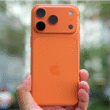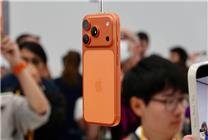Blogger Sparks Controversy After Scratching iPhone 17 Pro Demo in Apple Store
Summary:
- A video showing a blogger intentionally scratching an iPhone 17 Pro demonstration unit in an Apple store has generated widespread backlash.
- Discussions on social media reflect the community’s disapproval, with many accusing the blogger of irresponsibility.
- The iPhone 17 Pro features notable design changes, including an aluminum alloy body and a unique glass back which may be more prone to scratches.
In a recent incident that has stirred up significant controversy, a blogger has been caught on video scratching an iPhone 17 Pro demonstration machine while visiting an Apple Store. This provocative act has led to a flood of reactions across social media platforms, prompting a discussion around responsible technology use and the implications of such demonstrations.
The video, shared on the popular platform Douyin, shows the blogger allegedly using the back cover of the device to rub against a metal plate. The result? Scratches on the high-end iPhone model. Viewers quickly flocked to the comment section, expressing disdain for what many perceive as a deliberately reckless act. Comments ranged from accusations of intentional malice to general disappointment in the blogger’s choice to engage in such behavior, reflecting a consensus that this was an act of irresponsibility.
The back-and-forth in the comments highlights broader conversations about the responsibilities of influencers and bloggers when it comes to product testing and demonstrations. Users expressed sentiments such as, "A good quality blogger," and, "You must have done it on purpose," which indicates a serious concern over the influence such actions can have on impressionable audiences.
The Design of iPhone 17 Pro: A Closer Look
The iPhone 17 Pro, released this year, showcases some of Apple’s most ambitious design choices to date. The model features an aluminum alloy integrated body, with the back covered by a super porcelain crystal glass that supports MagSafe charging. This combination aims to enhance durability, yet, as demonstrated by the blogger’s actions, it appears there are issues with scratch resistance when compared to harder materials like titanium.
Many users have come forward with reports citing that even typical handling may result in scratches on the aluminum alloy frame. Some enthusiasts using dust-free film tools for protective film installations noticed scratches appearing on their devices, leading to concerns about the material durability.
Social Media Reactions: Pro and Con
The incident has generated a dual narrative on social media, with some users defending the blogger’s actions as an innocent demonstration gone wrong, while the majority are vocalizing their disapproval. The community’s reaction underscores the divide between entertainment and ethics in the digital age, where influencers often walk a fine line between engaging content and responsible conduct.
Critics argue that such acts not only reflect poorly on the blogger but can also misrepresent the product’s integrity to potential consumers. When influencers prioritize sensationalism over genuine product demonstration, it can lead to misguided perceptions about the quality and durability of technology products.
Conclusion: The Responsibility of Influencers
This incident serves as a stark reminder of the responsibilities that influencers and bloggers hold. Their actions can help shape public opinion and consumer behavior, making it crucial to approach product interactions with integrity and respect.
As technology evolves and becomes more integral to our daily lives, maintaining high standards of accountability in product demonstrations will foster trust between consumers and brands. The iPhone 17 Pro may yet prove popular despite its susceptibility to scratches, but as this situation reveals, the manner in which we engage with technology plays a significant role in shaping its narrative.
Moving forward, both bloggers and brands need to consider the potential ramifications of their representations. Striving for authenticity in product representation will not only enhance consumer trust but also foster a more informed and responsible tech community.








